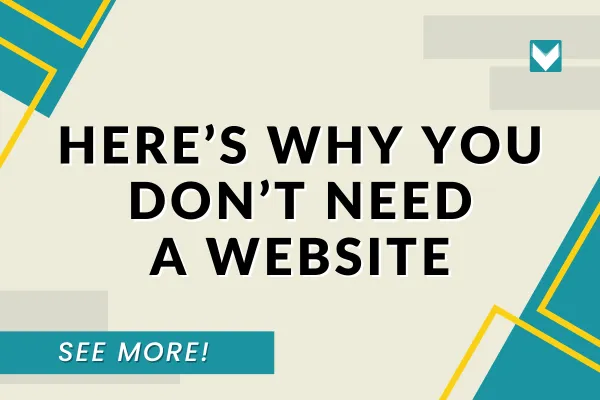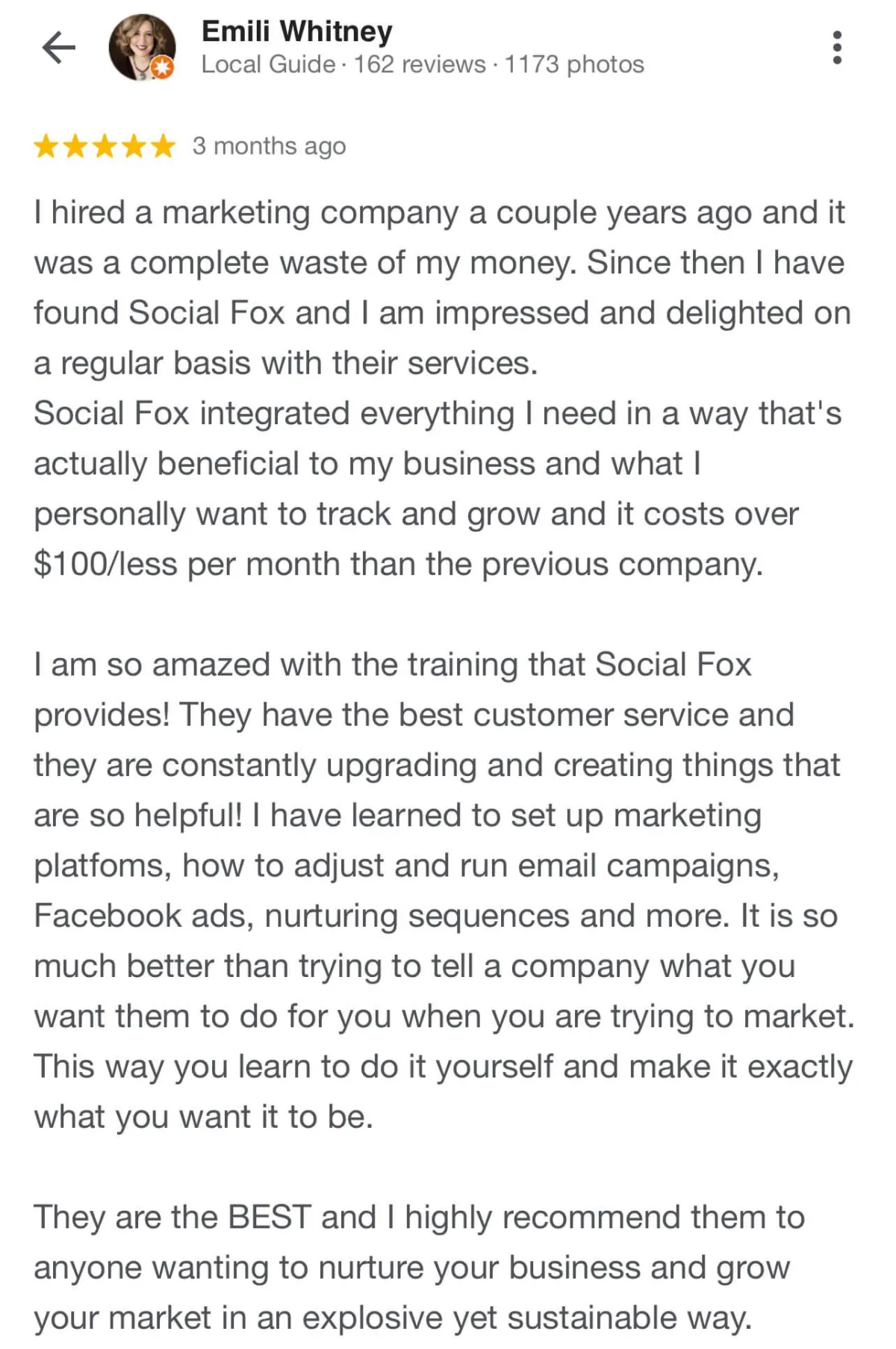

Here’s Why You Don’t Need A Website (...And Can Use A Funnel Page Instead)
What’s Actually The Difference Between A Funnel Page and a Website?
If you’re in the online space, these terms get thrown around all the time so before we even really jump into the topic at hand, let’s just clarify a couple things.
What’s the difference between a website and a funnel page?
A website and a funnel are both web pages but their functions and intentions can be quite different. You can think of a website like the map at the front of a big mall. You can take a look at all the options, browse around, and just generally see a variety of different stores on a self-guided tour.
In other words, there are a lot of options and a lot of places you can visit on a website. Websites typically have a homepage with a menu [or map] to help you navigate the different areas of the website.
Frequently on a website there are multiple brand goals that could all be in play at one. Potentially the websites intended to provide information to the consumer, generate leads for the business, or encourage sales.
A typical website has a page with instructions on how to contact the brand and has an about me, or about us, page. In addition to that, many websites have blogs, company updates, and can be used to drive traffic to other mediums [like their social media profiles, for example].
You can see that with a website, there are a lot of options! A funnel page is a much more intentional and curated experience. If we’re sticking with our mall example, you can think about a funnel page as being transported directly in front of the exact store you were wanting to visit in the mall.
In this way, a funnel takes all the other distractions and options off the table to create a streamlined experience with a single purpose. Funnel pages also include clear call-to-action statements, typically with one purpose: fill out a form, book a call, purchase a specific product, etc.
Funnels are intended to increase conversions by decreasing distraction. They’ll frequently provide reviews or social proof to encourage the lead to convert and might also utilize different strategies [like scarcity or urgency] to prompt quick action.
If you’re already wanting to get creating or maybe give a current funnel you have a little bit of a facelift, check out our free Funnel Setup Checklist to get our best advice on optimizing a highly converting funnel page.
So with this comparison of a website and a funnel page, I’m sure you can see where we’re headed… read on to find out why we think you don’t need a website to get your business off the ground or make money online!
Why You Should Be Using Funnels Instead Of A Website For Your Business
We outlined briefly how to use a funnel above, which essentially is to encourage your lead to take one specific action. By utilizing a funnel you cut out distraction from other offers, other pages, multiple places to click, etc. But what exactly are the major perks of utilizing funnel pages instead of a website? Let’s dive in.
Higher Conversion Rates
As we all know, in this age of social media and short form video, our attention spans as humans have decreased considerably. We’re constantly seeking that dopamine spike and needing to be entertained.
With a funnel page, you take so much of the distraction away and you use the copy on your funnel page to drive your lead to a specific action which prompts increased conversions over traditional websites.
By some measures, a website conversion rate is <2.5% whereas an average funnel conversion rate is frequently >5%. So by utilizing an optimized funnel page you could easily double your conversions. If that’s not a big pro for the funnel column, I don’t know what is.
Improved Insights/Data
By getting laser focused on your offer within your funnel, and knowing what your customer journey looks like, you have the ability to collect data identifying where any potential holes in your marketing process are.
Do you have a lot of visitors to your funnel but not many conversions? Your copy or graphics on your funnel pages probably need some work.
Do you have a high opt-in rate but you haven’t seen a bump in your sales? You probably need to take a look at how you’re nurturing that lead into a purchase.
By looking at the simplified data and understanding where your leads are coming from, what your conversion rates are, and where your customer might be dropping off you can easily make changes and test new strategies to improve your marketing efforts.
More Cost-Effective
I’m willing to bet that at one point or another you found yourself intimidated or overwhelmed about the process of building out a website, right?
It takes a good chunk of time if you’re doing it yourself or a good chunk of change if you’re outsourcing it to someone else.
Enter funnel pages!
These are much quicker to put together and design yourself [and much cheaper to outsource than an entire website], thereby saving you time and money over the long run.
The best part? Once you have a funnel built that’s converting well, you can easily re-use the bones of that funnel for a different offer in your business. Boom! Done.
Hyper-Focused Marketing
Since funnels are focused on a specific offer in your business they can be used masterfully to target segments of your audience.
If you’re building your email list correctly then you’re segmenting your list as you build. You know how each person came onto your list and you’re tracking what offerings in your business that have interest in. This is valuable data when it comes to selling and is really the whole point behind list segmentation.
Utilize that information to provide targeted and high converting funnels to different segments of your list and watch your sales soar.
More Automation and Scalability
Scaling is incredibly easy with funnel pages especially if you’ve got the business automation to back it up.
With an all-in-one marketing ecosystem, like Social Fox, you can easily create a funnel and then back that up with all the necessary automation to nurture your leads on autopilot, therefore improving your sales and allowing your business to scale with minimal extra effort.
If you’re new to business automation, we’ve outlined the 5 automations that we think every online business needs in this post.
These automations could provide a bump or upsell offer on the checkout page, immediately deliver your lead magnet, send out scheduled and curated nurture emails [and literally so much more that it would be impossible to outline in one single post].
The sky's the limit with business automation and funnel pages really put that automation to work.
Faster Load Times
From a purely technical aspect, funnels have way less going on than websites. Simply put, the fewer elements, additional pages, and functionality present on your webpage the quicker it will load.
I think we’ve all been there when we just want to check out a website and it takes so long to load that our social media brains check out and move on.
In fact, more than half of web users will move on after only three seconds of waiting for a website to load so, literally, every second counts.
Higher Ranks on Search Engines
Since funnel pages serve a single purpose and are centered around one offer they have a much higher chance of ranking for organic search.
Brand websites will likely only rank if someone types in their specific brand name to a search engine, which unless you have killer brand awareness, people might not be doing in the beginning.
On the other hand, a funnel page that sells a specific product or service has a better chance of coming up in an organic search when someone is seeking out a solution to their pain point.
Funnel pages provide a flexible and scalable alternative to a traditional website, often providing the business with more qualified and engaged leads, but the funnel itself is perhaps matched in importance with the softwares that backs it up. Read on to see what we think you need in your funnel building software.

Funnel Builder Must Haves
Hopefully at this point you’re beginning to see the magic of funnel pages and understand the power they can have in your business. Here’s the thing though, all funnel builders aren’t created equal.
There are a lot on the market, to be sure, but what you really want to look for is an all-in-one system that will not only allow you to build the funnel, but also automate and streamline your entire marketing system. Enter Social Fox.
Imagine for a moment that instead of having four different softwares to manage your business [and likely having to use Zapier so they get along nicely with each other] you had one marketing ecosystem that managed all aspects of your marketing. Under one login.
This isn’t a pipedream, we promise, it’s actually totally possible with Social Fox. Social Fox allows you to not only build out funnels [and websites if that’s your jam] but also back that up with powerful automations, the ability to manage your calendar, schedule your social media, message with your customer or leads, create email sequences to nurture on autopilot, track your Facebook or Google ads, and honestly a ton more stuff.
Last week we compared Social Fox to the well known funnel builder, ClickFunnels, so be sure to check out that post to see how their software compares to our all-in-one business ecosystem [complete with a cost comparison].
We hope that you’re as jazzed about funnels as we are and if you’re itching to get started on your next funnel, don’t miss out on our free Funnel Audit Checklist below! Use this to get your funnel right on the first time, or to do a tune up on a funnel you have that might not be converting as highly as expected. Happy editing!
© Copyright 2019 - 2026 | 🦊 Social Fox | All Rights Reserved | Privacy Policy | Terms Of Use
Let Social Fox Help You...
and ultimately be your business growth partner!

